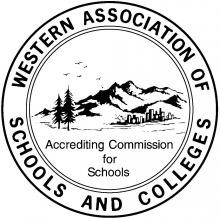About Us
Reports & Accreditations
As a Charter School there are a number of reports and accreditations that we are required by law to have available to our CCDS families and the public. Below are those reports for the past two years. Should you need anything else, please contact the office.
WASC Accreditation
The Accrediting Commission for Schools (ACS), Western Association of Schools and Colleges (WASC) is one of six regional accrediting associations in the United States. The Commission grants a status of accreditation when a school demonstrates the capacity to implement, monitor, and accomplish its action plan. The ACS/WASC accreditation process fosters excellence in elementary, secondary, and adult education by encouraging school improvement. A six-year cycle guides schools through an ongoing improvement process that includes implementation, assessment, and refinement of the schoolwide action plan on an annual basis.
WASC Mid-Cycle Progress Report 2019
We proudly are a WASC accredited school, which sets us apart as a reflective organization that is committed to excellence.
